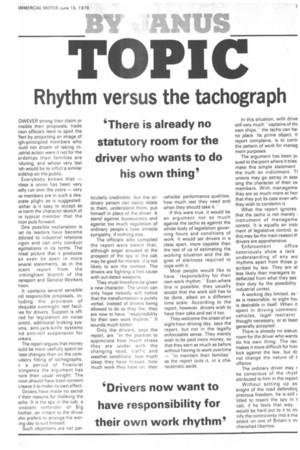TOP C
Page 77

If you've noticed an error in this article please click here to report it so we can fix it.
Rhythm versus the tachograph
`There is already no statutory room for the driver who wants to do his own thing'
OWEVER strong their claim or msible their proposals, trade nion officials tend to spoil the feet by projecting an image of igh-principled members who 'mild not dream of taking inistrial action were it not for the ardships their families are lduring, and whose very last ish would be to inflict a similar 3 rdship on the public.
Everybody knows that — nless a union has been very adly run over the years — very iw members are in such a deserate plight as is suggested. either is it easy to accept as le norm the character sketch of le typical member that the nion puts forward.
One possible explanation is iat its leaders have become cldicted to industrial relations irgon and can only conduct egotiations in its terms. The nreal picture that it produces an even be seen in more eneral statements, as in the 3cent report from the irmingham branch of the ransport and General Workers lnion.
It contains several sensible nd responsible proposals, inluding the provision of dequate overnight rest facilies for drivers. Support is offred for legislation on noise ontrol, additional braking sysams, anti-jack-knife systems rid anti-roll suspension for mkers.
The report argues that money ould be more usefully spent on -iese changes than on the cornlulsory fitting of tachographs. ri a period of financial tringency the argument has lore than usual weight. The Inion should have been content 3 leave it to make its own effect. Drivers have made no secret if their reasons for disliking the acho. It is the spy in the cab, a onstant reminder of Big lrother, an irritant to the driver vho prefers to arrange his woring day to suit himself.
Such objections are not par
ticularly creditable, but the ordinary person can easily relate to them, understand them, put himself in place of the driver. A stand against bureaucracy and against too much regulation of ordinary people's lives attracts sympathy, if nothing else.
The officials who compiled the report were aware that, although anger aroused at the prospect of the spy in the cab may be good for morale, it is not likely to win the contest. The drivers are fighting a lost cause with out-dated weapons.
They must therefore be given a new character. The union can only hope nobody will notice that the transformation is purely verbal. Instead of drivers being allowed to do as they like, they are now to have "responsibility for their own work rhythm.'" It sounds much better.
Only the drivers, says the report, are "in the position to appreciate how much stress they are under with the changing road, traffic and weather conditions, how much sleep they have missed, how much work they have on, their
vehicles' performance qualities, how much rest they need and when they should take it."
If this were true, it would be an argument not so much against the tacho as against the whole body of legislation governing hours and conditions of work. It would set drivers in a class apart, more capable than the rest of us of estimating the working situation and the degree of alertness required to cope with it,
Most people would like to have -responsibility for their own work rhythm." Even where this is possible, they usually accept that the work still has to be done, albeit on a different time scale. According to the report, however, drivers wish to have their cake and eat it too.
They welcome the onset of an eight-hour driving day, says the report, but not in the legally enforceable sense. They merely wish to be paid more money, so that they earn as much as before without having to work overtime — "to maintain their families" as the report puts it, in a characteristic aside. In this situation, with drive still very much "captains of th( own ships," the tacho can ha no place. Its prime object, tl report complains, is to contr the pattern of work for manag ment purposes.
The argument has been pt. sued to the point where it tries make this simple statement the truth an indictment. TI unions may go astray in assE sing the character of their ov members. With manageme they are so much more at hor that they put its case even whi they wish to condemn it.
What the report ignores that the tacho is not merely instrument of manageme control. It is equally an insti ment of legislative control, ai this may be the main reason tldrivers are apprehensive.
Enforcement office notoriously show a lack understanding of any wo rhythms apart from those p scribed by law. They are al less likely than managers to deflected from what they see their duty by the possibility industrial unrest.
A working day limited, as as is reasonable, to eight hoi. is desirable in itself. When it spent in driving commerc vehicles, legal restraint thought necessary, or at least generally accepted.
There is already no statutc room for the driver who wants do his own thing. The tac makes it more difficult for him kick against the law, but dc not change the nature of t offence.
The ordinary driver may r be conscious of the rhyth attributed to him in the report Without setting up as knight of the road defendinc precious freedom, he is still titled to resent the spy in t cab, if he feels that way. would be hard put to it to rm nify the controversy into a ma attack on one of Britain's mi cherished liberties.




























































































































